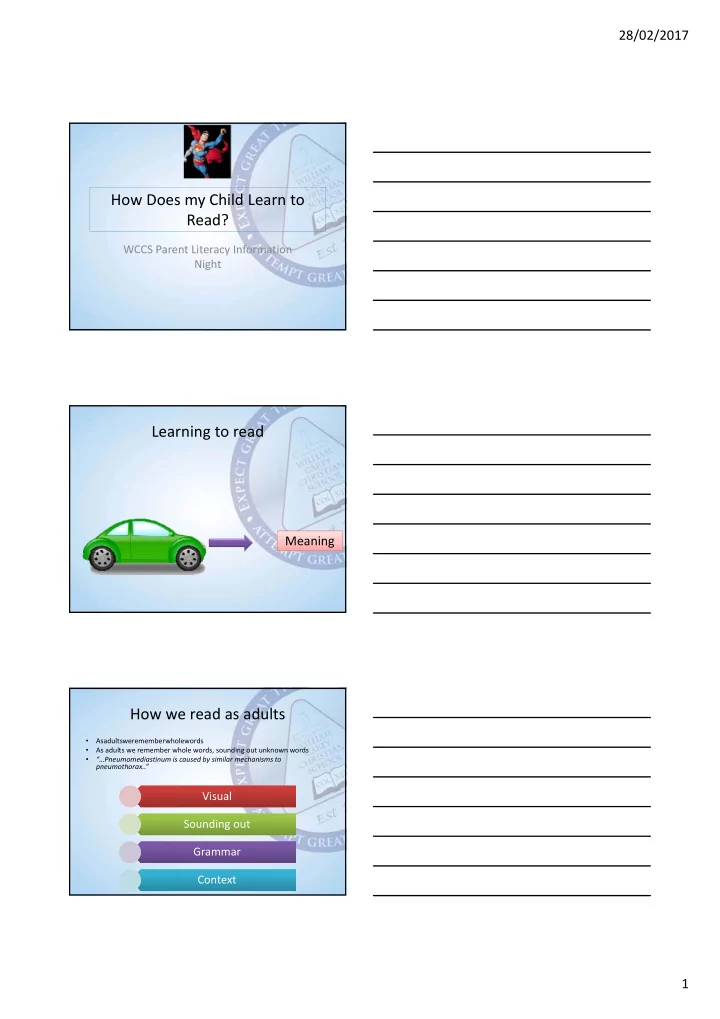

28/02/2017 How Does my Child Learn to Read? WCCS Parent Literacy Information Night Learning to read Meaning How we read as adults • Asadultswerememberwholewords • As adults we remember whole words, sounding out unknown words • “…Pneumomediastinum is caused by similar mechanisms to pneumothorax..” Visual Visual Sounding out Sounding out Grammar Grammar Context Context 1
28/02/2017 Big 6 Skills of Reading Reading Reading Phonics & Phonics & accuracy & accuracy & Sight Words Sight Words fluency fluency Phonemic Phonemic Vocabulary Vocabulary awareness awareness Oral Oral Meaning Meaning Comprehension Comprehension Language Language Read About It: Scientific Evidence for the Effective Teaching of Reading, (2016) Kerry Hempenstall (author) and Jennifer Buckingham (ed), CIS Research Report Oral Language • To understand printed language, oral language is a necessity. • Children need strong vocabularies and strong grammatical skills when they come to interpret texts • “I see a tear in her ______” • At Prep and school‐ picture talks, news, predicting • At home‐ read to your child, with your child; wondering what might happen next? recasting. Oral Language • Children talk before they start to read. • Negotiate, discuss, explain, sing, question, form opinions • Develop wide bank of meaningful vocabulary 2
28/02/2017 Print and Oral Language Together Exposure to print in everyday life Phonemic Awareness • The ability to focus on the sounds of speech • The knowledge that speech is broken up into words, words into syllables, syllables into separate sounds. • E.g when I say the word “boat” what sound does my mouth make first • This will help later on when students when they are learning about word families • At home: I spy; nursery rhymes; songs and chants Hearing sounds • What are syllables? • Breaking words into separate parts • Try these words: wallaby, dog, playground, hippopotamus, car • Blending syllables: class + room = classroom • Rhyming words: man, fan, can, ran…. • Unless they learn to make meaning from the marks on the page, learning the ABC’s is just a song 3
28/02/2017 Phonics and Sight Words • The relationship between a letter and its sound • Blending sounds together a‐ m=am • Blending 3 sounds together S‐a‐m= Sam • Deliberate teaching of phonics is necessary but not enough • Whilst phonic instruction is necessary, it will not help when students encounter irregular or “sight” words such as “said” or “saw” • At school‐ initial sounds, blending, word families, Minilit, spelling lists, sight word lists • At home‐ – assist with sounding out (get your mouth ready to sound out this word) – flashcards for sight words (hidden treasure, go fish, memory) Reading accuracy and fluency • Meaning is always the goal • Start with a text with a high level of easily recognised words with picture support (RRL1) I can jump I can run I can fly • Gradual increase in difficulty of text to Level 30. 4
28/02/2017 At school • Vygotsky‐ zone of proximal development • A text where a child can read 90% of the words‐ Teacher, parent as coach to help student with strategies to work out unknown words • The level a child is on is not just about getting every word right. Must be able to demonstrate understanding. • Fluency is a key component of comprehension. Developing fluency at a certain level is key before moving on to a more challenging text Vocabulary • Successful readers are exposed to a breadth of vocabulary words in conversations and print at home and at school from a very early age • “David was disappointed by his team’s dismal results” 5
28/02/2017 Comprehension • To comprehend is to understand • Fluency is important in comprehension • Successful readers: – Link what they read to prior knowledge – Can identify “who, what, where, when and why” words – Create mental images for what they are reading “make a movie” in their mind • At school‐ deliberate teaching of comprehension skills. Not putting a student up in reading levels until they can demonstrate fluency and understanding. • At home‐ talk about a book before reading it. Building reading skills • Read many books to your child • Hear and explore rhymes in words • Talk about a book and listen to their response • Learn new words and use them through your day • Pose questions “I wonder what/why/how” • Have fun with words, make up silly songs • Develop a bank of polysyllabic words: fantastic, hippopotamus, chrysalis, enormous 6
28/02/2017 What does reading look like at Prep school? • Learning skills of reading using our eyes, ears, hands • Reading for a purpose • Reading together, with a teacher, independently • Writing something for others to read What does reading look like at school? Preventative Model • Screening • Targeted instruction • Referrals to specialists • Tracking & monitoring 7
28/02/2017 At home • Read aloud to your child • Provide daily opportunities for your child to read to you. • Pause, Prompt, Praise • e.g. “ The brown bear growled at me” • At the end of the sentence ask student to Pause. Go back to the word misread. Prompt. Look at the beginning sound(s), now go back to the beginning of the sentence and read again. What would make sense? Reread whole sentence. Praise “I really liked the way you …..” • What do you think this book could be about? Questions? 8
Recommend
More recommend